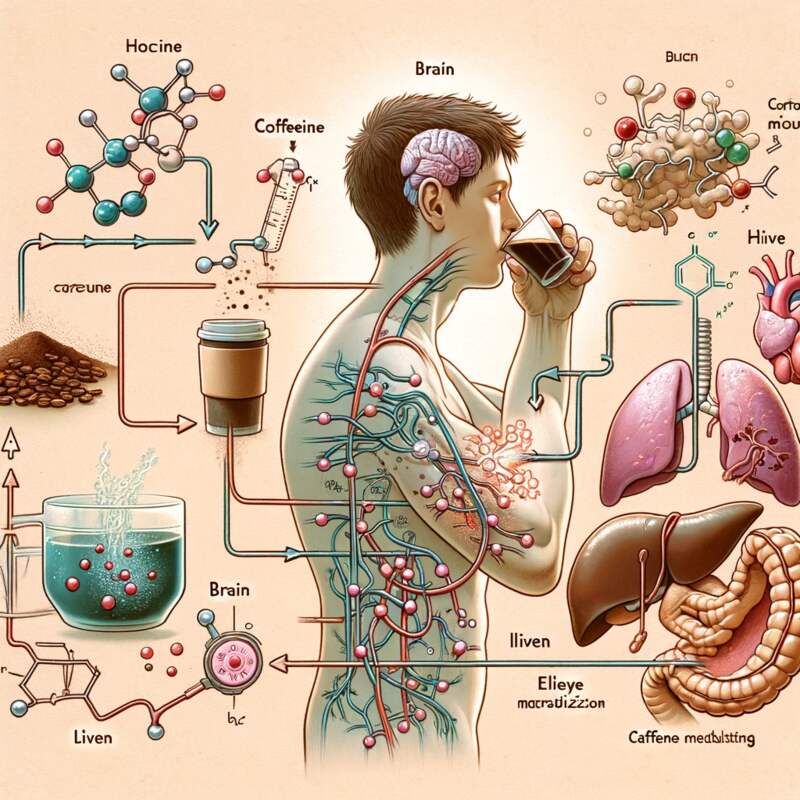In this comprehensive blog post, Caffeine and Health we will explore the fascinating world of caffeine and its impact on our health. From its effects on sleep patterns to its potential benefits and drawbacks, we will delve into the most frequently asked questions surrounding caffeine.
Whether you’re a coffee lover or simply curious about this popular stimulant, join us as we uncover the truth behind caffeine and its relationship with our well-being.
Introduction to Caffeine:
Caffeine is a natural stimulant that is found in various plants, including coffee beans, tea leaves, and cacao pods. It has gained immense popularity worldwide due to its ability to enhance alertness, improve focus, and increase energy levels. However, with its widespread use, questions about its effects on health have emerged.
How Does Caffeine Affect Sleep?
One of the most common concerns regarding caffeine is its impact on sleep patterns. Caffeine stimulates the central nervous system, promoting wakefulness and reducing fatigue. Consuming caffeine too close to bedtime can interfere with falling asleep and the quality of sleep.
Research suggests that it takes about 6 hours for half of the caffeine in your system to be eliminated, so it’s advisable to limit caffeine intake in the late afternoon and evening.
The Relationship Between Caffeine and Dehydration
There is a common misconception that caffeinated beverages lead to dehydration. While caffeine does have mild diuretic properties, studies suggest that the fluid intake from caffeinated beverages still contributes to overall hydration.
To maintain optimal hydration, it’s recommended to balance caffeine intake with an adequate amount of water.
Caffeine and Physical Performance
Caffeine has been widely studied for its potential benefits on physical performance. It has been shown to improve endurance, reduce perceived exertion, and enhance muscle strength. These effects are attributed to caffeine’s ability to stimulate the release of adrenaline and increase fat oxidation.
Individual responses to caffeine may vary, and it’s important to consider personal tolerance levels and avoid excessive consumption.
The Influence of Caffeine on Mental Health
Caffeine’s impact on mental health is a topic of ongoing research. While moderate caffeine intake is generally considered safe for most individuals, excessive consumption can lead to anxiety, restlessness, and even panic attacks in some susceptible individuals.
Individuals with certain mental health conditions such as generalized anxiety disorder or bipolar disorder may be more sensitive to the effects of caffeine. Consulting with a healthcare professional is advised for those with pre-existing mental health concerns.
Caffeine and Pregnancy
Pregnant women often have questions about consuming caffeine during pregnancy. While moderate caffeine intake (about 200-300 mg per day) is generally considered safe, high levels of caffeine have been associated with an increased risk of miscarriage and preterm birth.
It’s important for pregnant women to monitor their caffeine intake and consider alternatives such as decaffeinated beverages or herbal teas.
Potential Health Benefits of Caffeine
Caffeine may offer several potential health benefits when consumed in moderation. Research suggests that it may protect against certain diseases such as Parkinson’s disease, liver cirrhosis, and certain types of cancer. Caffeine has been linked to improved cognitive function, including enhanced memory and attention span.
Drawbacks of Excessive Caffeine
Consumption While moderate caffeine intake is generally safe for most individuals, excessive consumption can lead to various negative effects. These include increased heart rate, digestive issues such as acid reflux or stomach ulcers, headaches, and insomnia.
Excessive caffeine intake can contribute to dependence and withdrawal symptoms when abruptly stopped. To be mindful of personal tolerance levels and consume caffeine in moderation.
Caffeine Sensitivity and Individual Differences
Individuals vary in their sensitivity to caffeine due to genetic factors and personal metabolism. Some people may experience side effects such as jitters, nervousness, or digestive discomfort even with small amounts of caffeine, while others may tolerate higher doses without adverse effects.
Managing Caffeine Intake
To effectively manage your caffeine intake, it’s important to be aware of the caffeine content in various beverages and food items. Here are some tips to help you regulate your consumption:
Read labels:
Pay attention to the caffeine content listed on labels of packaged foods, energy drinks, and even medications. This will give you an idea of how much caffeine you’re consuming.
Monitor your coffee and tea intake:
Coffee and tea are popular sources of caffeine. Keep track of the number of cups you drink daily and consider switching to decaffeinated options or herbal teas if you want to reduce your caffeine intake.
Be cautious with energy drinks:
Energy drinks often contain high levels of caffeine and other stimulants. It’s advisable to limit or avoid these beverages, especially for individuals who are sensitive to caffeine or have underlying health conditions.
Gradually reduce caffeine intake:
If you feel that you’re consuming too much caffeine, consider gradually reducing your intake instead of quitting abruptly. This can help minimize withdrawal symptoms such as headaches and fatigue.
Opt for alternatives:
If you still want a hot beverage without the caffeine, try herbal teas like chamomile or rooibos. These options offer a soothing experience without the stimulating effects of caffeine.
Stay hydrated:
Remember to balance your caffeine consumption with adequate water intake. Drinking enough water throughout the day will help maintain hydration levels and counteract any potential diuretic effects of caffeine.
Caffeine and Medications/Supplements
It’s important to be mindful of potential interactions between caffeine and certain medications or supplements. Caffeine can enhance or interfere with the effects of various substances. Here are a few examples:
Medications:
Caffeine can interact with certain medications, including those used for asthma, heart conditions, or psychiatric disorders. It’s crucial to consult your healthcare provider or pharmacist if you have any concerns about mixing caffeine with your medications.
Supplements:
Some dietary supplements, such as weight loss or performance-enhancing products, may contain caffeine or other stimulants. Using these supplements in combination with other sources of caffeine can lead to excessive intake and potential health risks.
Always read product labels carefully and consult with a healthcare professional before combining caffeine with medications or supplements.
Caffeine Alternatives
If you’re looking to reduce your caffeine intake or eliminate it altogether, there are plenty of alternatives to consider. Here are a few options:
Herbal teas: Explore the world of herbal teas, which come in a variety of flavors and offer a caffeine-free alternative. Some popular choices include chamomile, peppermint, ginger, and hibiscus.
Decaffeinated coffee or tea: If you enjoy the taste of coffee or tea but want to reduce your caffeine intake, opt for decaffeinated versions. These beverages undergo a process to remove most of the caffeine content while retaining the flavor.
Fruit-infused water: Instead of reaching for a caffeinated beverage, try flavoring your water with fresh fruits like lemon, berries, or cucumber slices for a refreshing and hydrating option.
Natural energy boosters: Incorporate natural energy boosters into your routine, such as getting regular exercise, practicing good sleep hygiene, and eating a balanced diet rich in fruits, vegetables, and whole grains.
Caffeine Withdrawal Symptoms and Management
If you decide to cut back on caffeine or eliminate it completely, you may experience withdrawal symptoms. These symptoms can vary from person to person but commonly include:
- Headaches: Caffeine withdrawal is often associated with headaches that can range from mild to severe. Staying hydrated, getting enough rest, and using over-the-counter pain relief may help alleviate symptoms.
- Fatigue: As your body adjusts to the absence of caffeine, you may feel more tired than usual. Be patient with yourself and allow time for your energy levels to stabilize.
- Irritability and mood changes: Caffeine withdrawal can affect your mood and make you feel irritable or anxious. Engaging in stress-management techniques like deep breathing or meditation can help manage these symptoms.
- Difficulty concentrating: As caffeine is known to enhance focus and alertness, its withdrawal may temporarily result in difficulty concentrating. Taking breaks, staying organized, and practicing mindfulness can assist in maintaining productivity during this adjustment period.
Conclusion
Caffeine is a widely consumed substance that can have both positive and negative effects on our health. By understanding its impact on sleep patterns, hydration, physical performance, mental health, pregnancy, and overall well-being, we can make informed decisions about our caffeine consumption.
Moderation is key when it comes to consuming caffeine, as individual responses may vary. Monitoring your intake, being mindful of personal tolerance levels, and considering alternatives can help you strike a balance between enjoying the benefits of caffeine while prioritizing your health.
Always consult with a healthcare professional if you have any concerns about the impact of caffeine on pre-existing health conditions or if you’re unsure about how much caffeine is safe for you.
By being aware of the potential benefits and drawbacks of caffeine consumption, you can navigate the world of caffeinated beverages with confidence while prioritizing your overall wellness.
Q: How does caffeine affect health?
A: Caffeine may have both positive and negative effects on health. It can increase alertness and improve concentration, but excessive consumption may lead to negative side effects such as anxiety, insomnia, and increased heart rate.
Q: How much caffeine is in a typical cup of coffee?
A: A typical cup of coffee contains about 95 milligrams of caffeine, but this can vary depending on the type of coffee and brewing method.
Q: Is it safe to drink coffee every day?
A: For most people, moderate coffee consumption, usually defined as 3-4 cups a day, is considered safe and may even have some health benefits.
Q: What are the potential risks of consuming too much caffeine?
A: Consuming too much caffeine can lead to negative side effects such as increased anxiety, insomnia, digestive issues, rapid heart rate, and in some cases, can even be toxic.
Q: How can caffeine intake affect sleep?
A: Caffeine can disrupt sleep patterns, especially if consumed later in the day. It may lead to difficulty falling asleep, staying asleep, or experiencing restful sleep.
Q: Is there a difference in the caffeine content between caffeinated and decaffeinated coffee?
A: Yes, decaffeinated coffee contains significantly less caffeine compared to regular caffeinated coffee.
Q: How does caffeine consumption affect people with certain health conditions?
A: Caffeine may increase heart rate and blood pressure, which can be a concern for individuals with certain heart conditions or high blood pressure.
Q: Can drinking coffee have an impact on concentration and focus?
A: Caffeine is a stimulant that can enhance alertness and improve concentration. Moderate consumption of caffeinated coffee may positively impact focus and cognitive function for some individuals.
Q: What is the recommended daily intake of caffeine?
A: For most adults, a moderate daily caffeine intake of up to 400 milligrams, roughly equivalent to four 8-ounce cups of brewed coffee, is considered safe.
Q: Should individuals consult a health care provider about their coffee consumption?
A: Individuals with specific health concerns, such as pregnancy, cardiovascular issues, or sleep disturbances, should consult a health care provider to determine the appropriate level of caffeine consumption for their individual health needs and circumstances.

